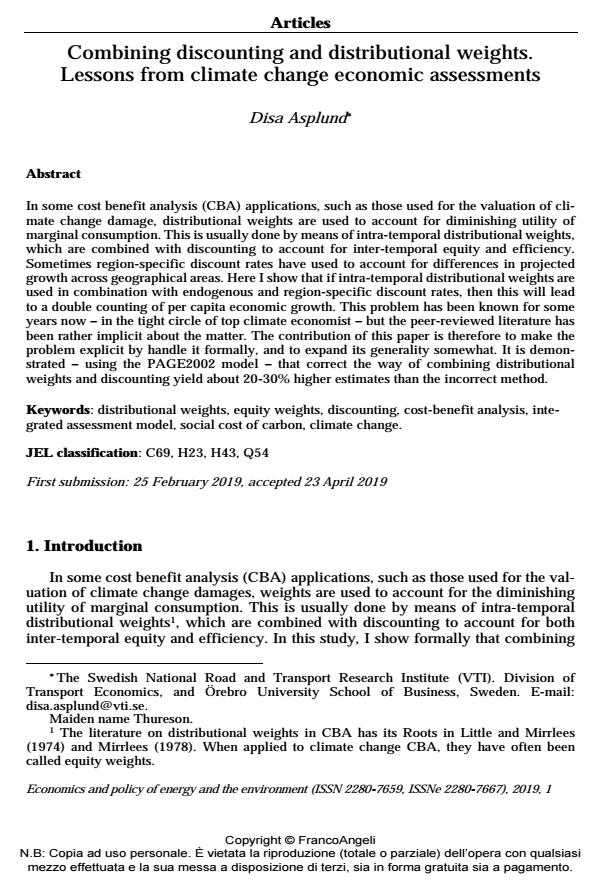Combining discounting and distributional weights. Lessons from climate change economic assessments
Titolo Rivista ECONOMICS AND POLICY OF ENERGY AND THE ENVIRONMENT
Autori/Curatori Disa Asplund
Anno di pubblicazione 2019 Fascicolo 2019/1 Lingua Inglese
Numero pagine 21 P. 181-201 Dimensione file 228 KB
DOI 10.3280/EFE2019-001012
Il DOI è il codice a barre della proprietà intellettuale: per saperne di più
clicca qui
Qui sotto puoi vedere in anteprima la prima pagina di questo articolo.
Se questo articolo ti interessa, lo puoi acquistare (e scaricare in formato pdf) seguendo le facili indicazioni per acquistare il download credit. Acquista Download Credits per scaricare questo Articolo in formato PDF

FrancoAngeli è membro della Publishers International Linking Association, Inc (PILA)associazione indipendente e non profit per facilitare (attraverso i servizi tecnologici implementati da CrossRef.org) l’accesso degli studiosi ai contenuti digitali nelle pubblicazioni professionali e scientifiche
In some cost benefit analysis (CBA) applications, such as those used for the valuation of climate change damage, distributional weights are used to account for diminishing utility of marginal consumption. This is usually done by means of intra-temporal distributional weights, which are combined with discounting to account for inter-temporal equity and efficiency. Sometimes region-specific discount rates have used to account for differences in projected growth across geographical areas. Here I show that if intra-temporal distributional weights are used in combination with endogenous and region-specific discount rates, then this will lead to a double counting of per capita economic growth. This problem has been known for some years now - in the tight circle of top climate economist - but the peer-reviewed literature has been rather implicit about the matter. The contribution of this paper is therefore to make the problem explicit by handle it formally, and to expand its generality somewhat. It is demonstrated - using the PAGE2002 model - that correct the way of combining distributional weights and discounting yield about 20-30% higher estimates than the incorrect method. .
Keywords:Distributional weights, equity weights, discounting, cost-benefit analysis, integrated assessment model, social cost of carbon, climate change
Jel codes:C69, H23, H43, Q54
- Dietz S., Anderson D., Stern N., Taylor C. and Zenghelis D. (2007). Right for the Right Reasons: A final rejoinder on the Stern Review. World Economics, 8(2).
- Eyre N., Downing T., Hoekstra R. and Rennings K. (1999). Global warming damages. Final Report of the ExternE Global Warming Sub-task. DGXII, EC, Brussels. -- Available at: http://www.externe.info/externe_2006/.
- Harberger A.C. (1978). On the Use of Distributional Weights in Social Cost-Benefit Analysis. Journal of Political Economy, 86(2): 87-120. DOI: 10.1086/260696
- Hope C. (2006). The Marginal Impact of CO2 from PAGE2002: An Integrated Assessment Model Incorporating the IPCC’s Five Reasons for Concern. The Integrated Assessment Journal, 6(1): 19-56.
- Little I.M.D. and Mirrlees J.A. (1974). Project appraisal and planning for developing countries. An HEB paperback. London: Heinemann Educational.
- Mirrlees J.A. (1978). Social benefit-cost analysis and the distribution of income. World Development, 6(2): 131-138. DOI: 10.1016/0305-750X(78)90003-7
- Nordhaus W.D. (1982). How Fast Should We Graze the Global Commons? The American Economic Review, 72(2): 242-246. -- https://www.jstor.org/stable/1802336.
- Nordhaus W.D. and Yang Z. (1996). A Regional Dynamic General-Equilibrium Model of Alternative Climate-Change Strategies. The American Economic Review, 86(49): 741-765. -- https://www.jstor.org/stable/2118303.
- Pearce D. and Nash C. (1981). The social appraisal of Projects – a Text in Cost-Benefit Analysis. London: Macmillan.
- Stanton E. (2011). Negishi welfare weights in integrated assessment models: the mathematics of global inequality. Climatic Change, 107: 417-432.
- Stern N. (2006). The Economics of Climate Change: The Stern Review. Cambridge: Cambridge University Press. -- Available at: http://www.hm-treasury.gov.uk/stern_review_report.htm.
- Tol R.S.J. (2015). Modified Ramsey Discounting for Climate Change. CESIFO Working Paper No. 5588.
- Waldhoff S., Anthoff D., Rose S. and Tol R.S.J. (2014). The Marginal Damage Costs of Different Greenhouse Gases: An Application of FUND. Economics: The Open-Access, Open-Assessment E-Journal, 8.
- Hope C. (2008). Discount rates, equity weights and the social cost of carbon. Energy Economics, 30: 1011-1019.
- Ackerman F., Stanton E.A., Hope C. and Alberth S. (2009). Did the Stern Review underestimate US and global climate damages? Energy Policy, 37(7): 2717-2721.
- Anthoff D. and Emmerling J. (2019). Inequality and the Social Cost of Carbon. Journal of the Association of Environmental and Resource Economists, 6: 29-59.
- Anthoff D., Hepburn C. and Tol R.S.J. (2009). Equity weighting and the marginal damage costs of climate change. Ecological Economics, 68: 836-849.
- Boadway R. (2006). Principles of Cost-Benefit Analysis. Public Policy Review, 2(1).
- Dasgupta Partha and Heal G.M. (1979). Economic Theory and Exhaustible Resources. Cambridge: Cambridge University Press.
Disa Asplund, Combining discounting and distributional weights. Lessons from climate change economic assessments in "ECONOMICS AND POLICY OF ENERGY AND THE ENVIRONMENT" 1/2019, pp 181-201, DOI: 10.3280/EFE2019-001012